Importance of Operation Management in Business Objectives
VerifiedAdded on 2022/12/27
|11
|3141
|46
AI Summary
This report discusses the importance of operation management in achieving business objectives. It covers topics such as logistics and inventory management, scheduling, and process design. It also explores the factors of the business environment that impact decision-making for leaders and managers.
Contribute Materials
Your contribution can guide someone’s learning journey. Share your
documents today.
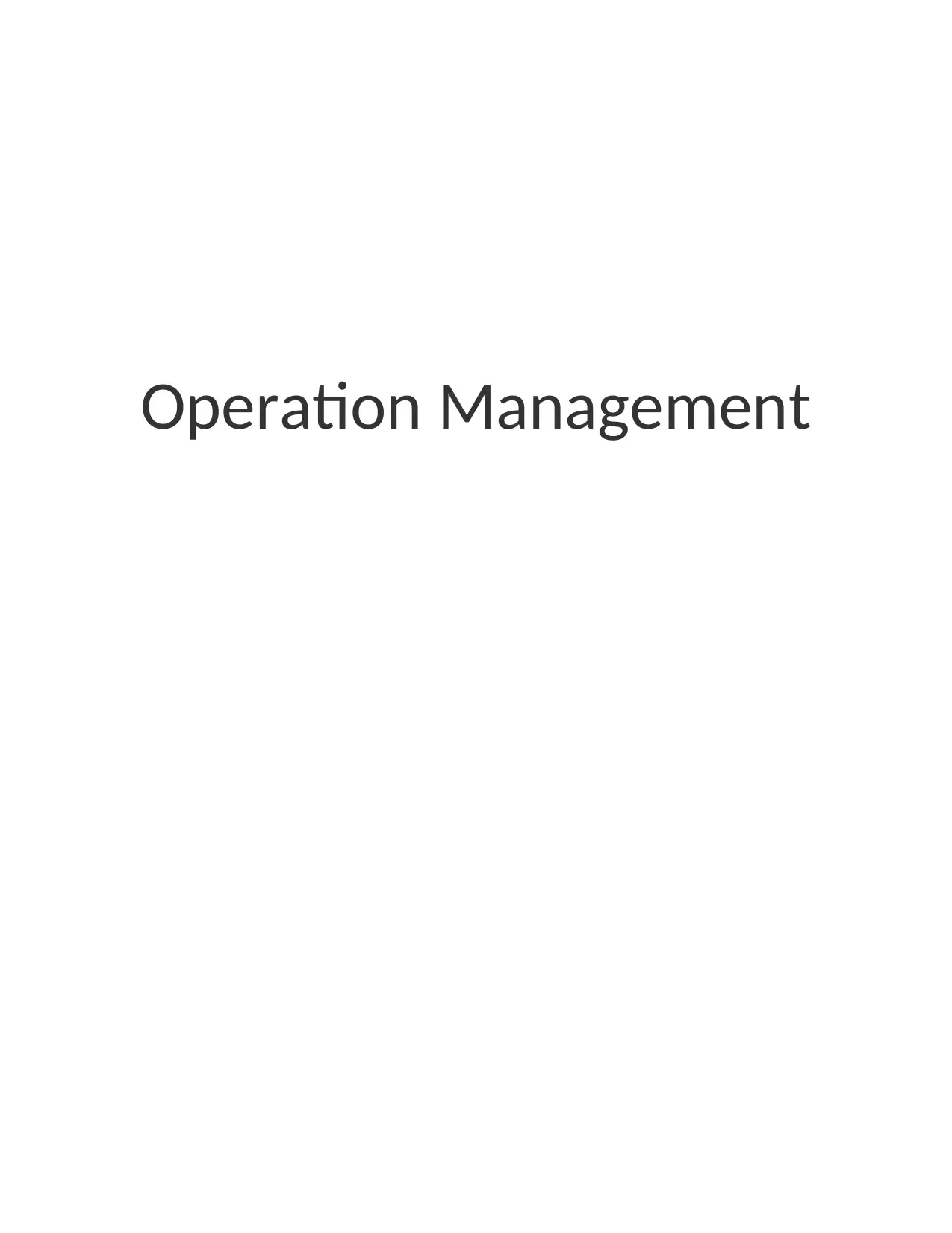
Operation Management
Secure Best Marks with AI Grader
Need help grading? Try our AI Grader for instant feedback on your assignments.
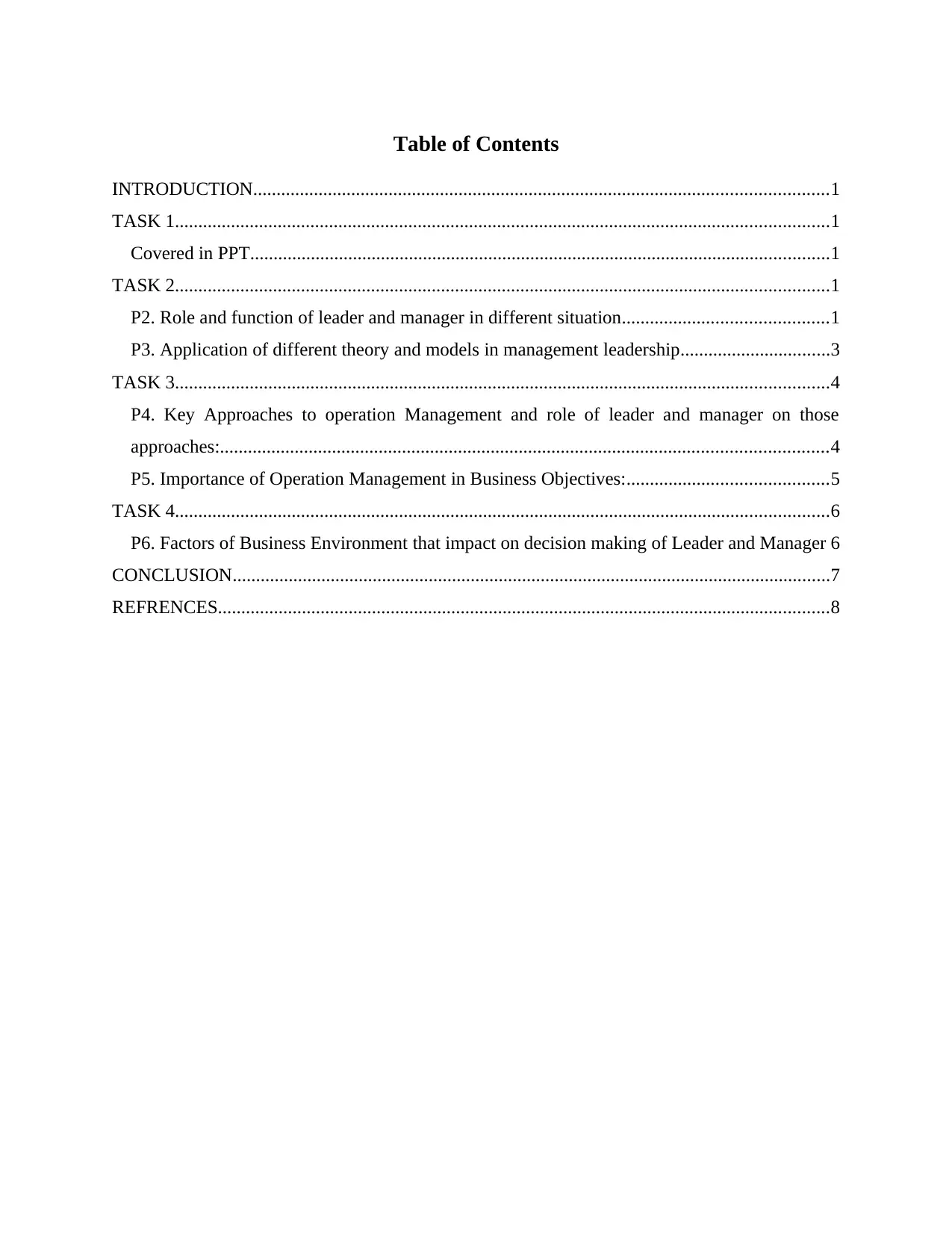
Table of Contents
INTRODUCTION...........................................................................................................................1
TASK 1............................................................................................................................................1
Covered in PPT............................................................................................................................1
TASK 2............................................................................................................................................1
P2. Role and function of leader and manager in different situation............................................1
P3. Application of different theory and models in management leadership................................3
TASK 3............................................................................................................................................4
P4. Key Approaches to operation Management and role of leader and manager on those
approaches:..................................................................................................................................4
P5. Importance of Operation Management in Business Objectives:...........................................5
TASK 4............................................................................................................................................6
P6. Factors of Business Environment that impact on decision making of Leader and Manager 6
CONCLUSION................................................................................................................................7
REFRENCES...................................................................................................................................8
INTRODUCTION...........................................................................................................................1
TASK 1............................................................................................................................................1
Covered in PPT............................................................................................................................1
TASK 2............................................................................................................................................1
P2. Role and function of leader and manager in different situation............................................1
P3. Application of different theory and models in management leadership................................3
TASK 3............................................................................................................................................4
P4. Key Approaches to operation Management and role of leader and manager on those
approaches:..................................................................................................................................4
P5. Importance of Operation Management in Business Objectives:...........................................5
TASK 4............................................................................................................................................6
P6. Factors of Business Environment that impact on decision making of Leader and Manager 6
CONCLUSION................................................................................................................................7
REFRENCES...................................................................................................................................8
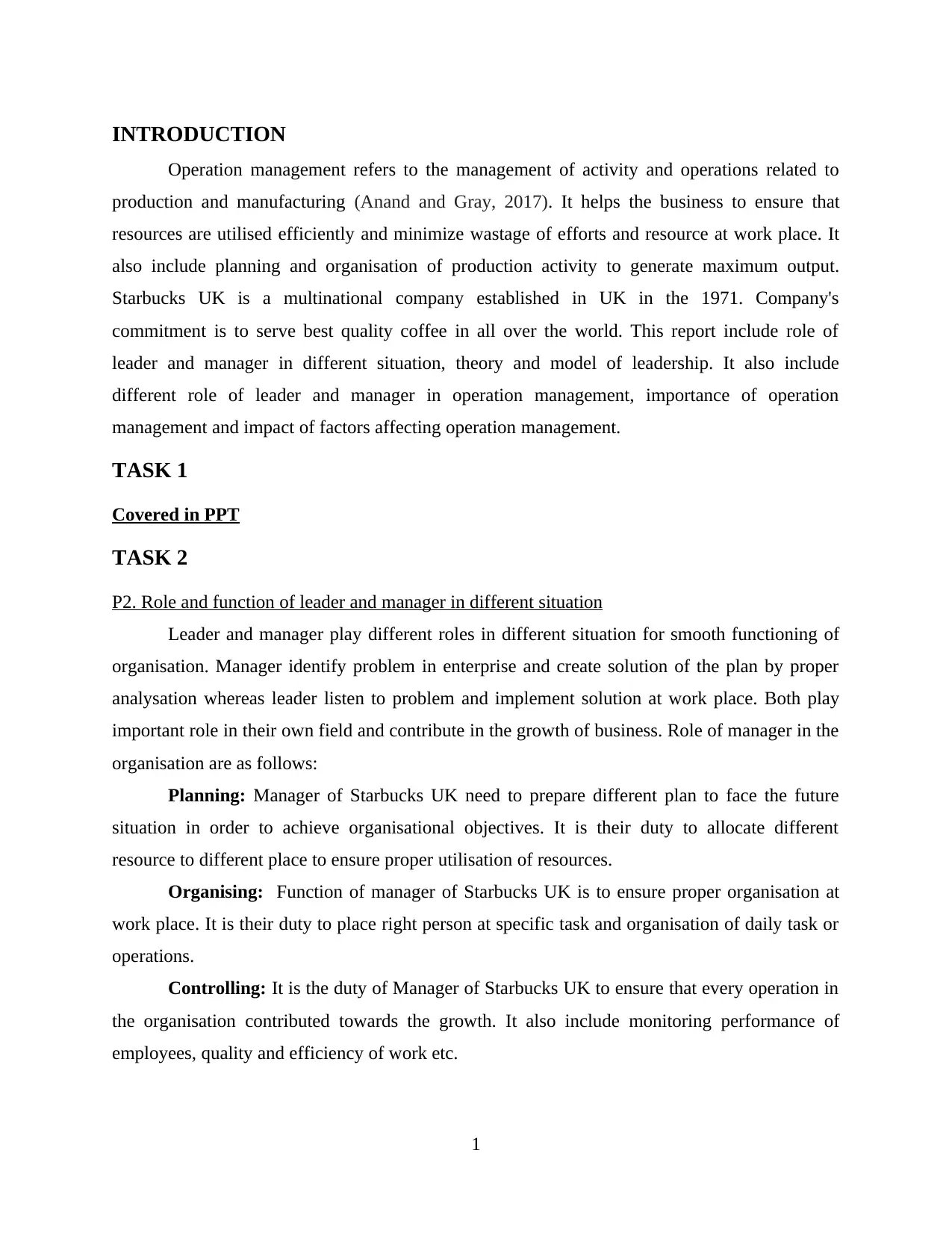
INTRODUCTION
Operation management refers to the management of activity and operations related to
production and manufacturing (Anand and Gray, 2017). It helps the business to ensure that
resources are utilised efficiently and minimize wastage of efforts and resource at work place. It
also include planning and organisation of production activity to generate maximum output.
Starbucks UK is a multinational company established in UK in the 1971. Company's
commitment is to serve best quality coffee in all over the world. This report include role of
leader and manager in different situation, theory and model of leadership. It also include
different role of leader and manager in operation management, importance of operation
management and impact of factors affecting operation management.
TASK 1
Covered in PPT
TASK 2
P2. Role and function of leader and manager in different situation
Leader and manager play different roles in different situation for smooth functioning of
organisation. Manager identify problem in enterprise and create solution of the plan by proper
analysation whereas leader listen to problem and implement solution at work place. Both play
important role in their own field and contribute in the growth of business. Role of manager in the
organisation are as follows:
Planning: Manager of Starbucks UK need to prepare different plan to face the future
situation in order to achieve organisational objectives. It is their duty to allocate different
resource to different place to ensure proper utilisation of resources.
Organising: Function of manager of Starbucks UK is to ensure proper organisation at
work place. It is their duty to place right person at specific task and organisation of daily task or
operations.
Controlling: It is the duty of Manager of Starbucks UK to ensure that every operation in
the organisation contributed towards the growth. It also include monitoring performance of
employees, quality and efficiency of work etc.
1
Operation management refers to the management of activity and operations related to
production and manufacturing (Anand and Gray, 2017). It helps the business to ensure that
resources are utilised efficiently and minimize wastage of efforts and resource at work place. It
also include planning and organisation of production activity to generate maximum output.
Starbucks UK is a multinational company established in UK in the 1971. Company's
commitment is to serve best quality coffee in all over the world. This report include role of
leader and manager in different situation, theory and model of leadership. It also include
different role of leader and manager in operation management, importance of operation
management and impact of factors affecting operation management.
TASK 1
Covered in PPT
TASK 2
P2. Role and function of leader and manager in different situation
Leader and manager play different roles in different situation for smooth functioning of
organisation. Manager identify problem in enterprise and create solution of the plan by proper
analysation whereas leader listen to problem and implement solution at work place. Both play
important role in their own field and contribute in the growth of business. Role of manager in the
organisation are as follows:
Planning: Manager of Starbucks UK need to prepare different plan to face the future
situation in order to achieve organisational objectives. It is their duty to allocate different
resource to different place to ensure proper utilisation of resources.
Organising: Function of manager of Starbucks UK is to ensure proper organisation at
work place. It is their duty to place right person at specific task and organisation of daily task or
operations.
Controlling: It is the duty of Manager of Starbucks UK to ensure that every operation in
the organisation contributed towards the growth. It also include monitoring performance of
employees, quality and efficiency of work etc.
1
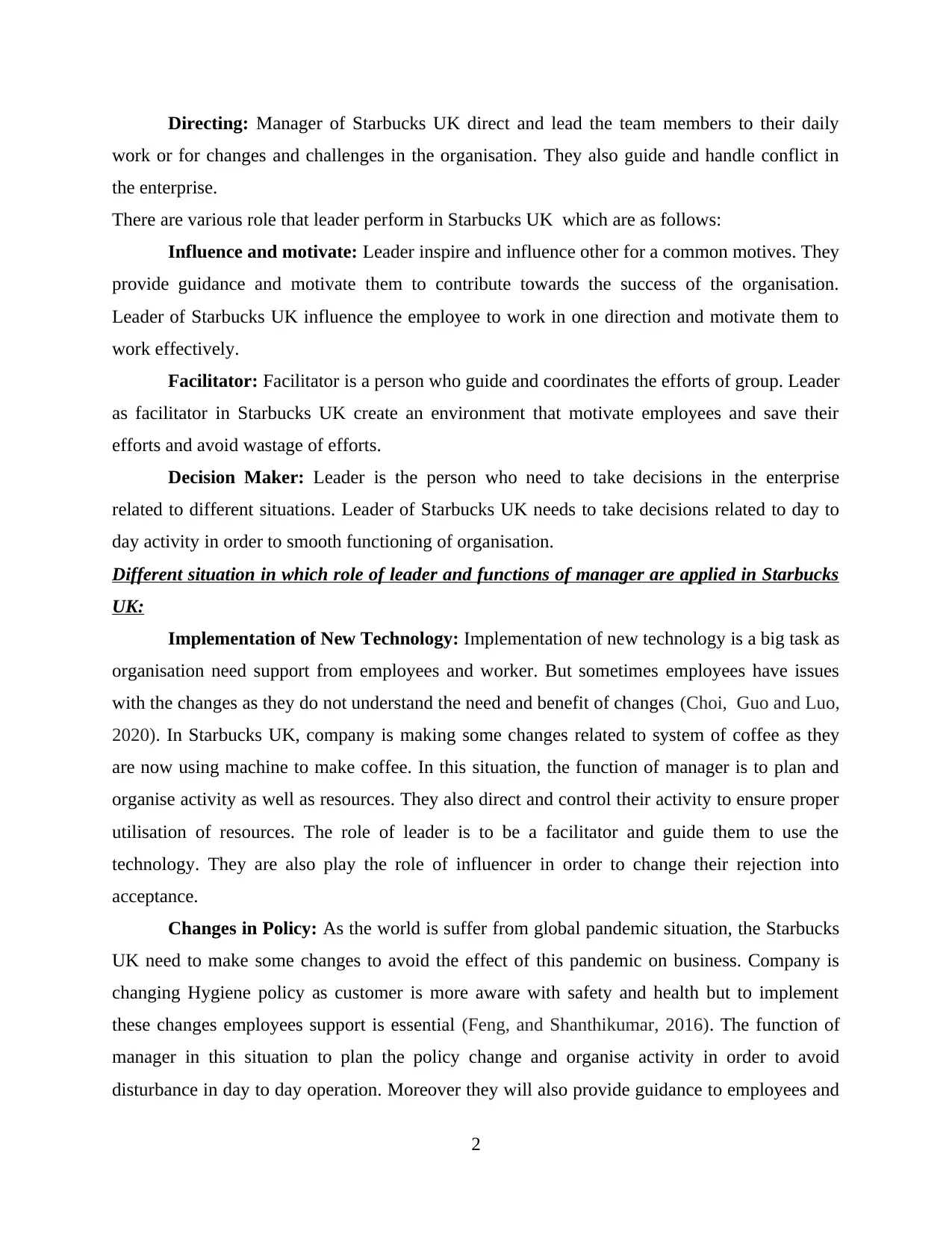
Directing: Manager of Starbucks UK direct and lead the team members to their daily
work or for changes and challenges in the organisation. They also guide and handle conflict in
the enterprise.
There are various role that leader perform in Starbucks UK which are as follows:
Influence and motivate: Leader inspire and influence other for a common motives. They
provide guidance and motivate them to contribute towards the success of the organisation.
Leader of Starbucks UK influence the employee to work in one direction and motivate them to
work effectively.
Facilitator: Facilitator is a person who guide and coordinates the efforts of group. Leader
as facilitator in Starbucks UK create an environment that motivate employees and save their
efforts and avoid wastage of efforts.
Decision Maker: Leader is the person who need to take decisions in the enterprise
related to different situations. Leader of Starbucks UK needs to take decisions related to day to
day activity in order to smooth functioning of organisation.
Different situation in which role of leader and functions of manager are applied in Starbucks
UK:
Implementation of New Technology: Implementation of new technology is a big task as
organisation need support from employees and worker. But sometimes employees have issues
with the changes as they do not understand the need and benefit of changes (Choi, Guo and Luo,
2020). In Starbucks UK, company is making some changes related to system of coffee as they
are now using machine to make coffee. In this situation, the function of manager is to plan and
organise activity as well as resources. They also direct and control their activity to ensure proper
utilisation of resources. The role of leader is to be a facilitator and guide them to use the
technology. They are also play the role of influencer in order to change their rejection into
acceptance.
Changes in Policy: As the world is suffer from global pandemic situation, the Starbucks
UK need to make some changes to avoid the effect of this pandemic on business. Company is
changing Hygiene policy as customer is more aware with safety and health but to implement
these changes employees support is essential (Feng, and Shanthikumar, 2016). The function of
manager in this situation to plan the policy change and organise activity in order to avoid
disturbance in day to day operation. Moreover they will also provide guidance to employees and
2
work or for changes and challenges in the organisation. They also guide and handle conflict in
the enterprise.
There are various role that leader perform in Starbucks UK which are as follows:
Influence and motivate: Leader inspire and influence other for a common motives. They
provide guidance and motivate them to contribute towards the success of the organisation.
Leader of Starbucks UK influence the employee to work in one direction and motivate them to
work effectively.
Facilitator: Facilitator is a person who guide and coordinates the efforts of group. Leader
as facilitator in Starbucks UK create an environment that motivate employees and save their
efforts and avoid wastage of efforts.
Decision Maker: Leader is the person who need to take decisions in the enterprise
related to different situations. Leader of Starbucks UK needs to take decisions related to day to
day activity in order to smooth functioning of organisation.
Different situation in which role of leader and functions of manager are applied in Starbucks
UK:
Implementation of New Technology: Implementation of new technology is a big task as
organisation need support from employees and worker. But sometimes employees have issues
with the changes as they do not understand the need and benefit of changes (Choi, Guo and Luo,
2020). In Starbucks UK, company is making some changes related to system of coffee as they
are now using machine to make coffee. In this situation, the function of manager is to plan and
organise activity as well as resources. They also direct and control their activity to ensure proper
utilisation of resources. The role of leader is to be a facilitator and guide them to use the
technology. They are also play the role of influencer in order to change their rejection into
acceptance.
Changes in Policy: As the world is suffer from global pandemic situation, the Starbucks
UK need to make some changes to avoid the effect of this pandemic on business. Company is
changing Hygiene policy as customer is more aware with safety and health but to implement
these changes employees support is essential (Feng, and Shanthikumar, 2016). The function of
manager in this situation to plan the policy change and organise activity in order to avoid
disturbance in day to day operation. Moreover they will also provide guidance to employees and
2
Secure Best Marks with AI Grader
Need help grading? Try our AI Grader for instant feedback on your assignments.
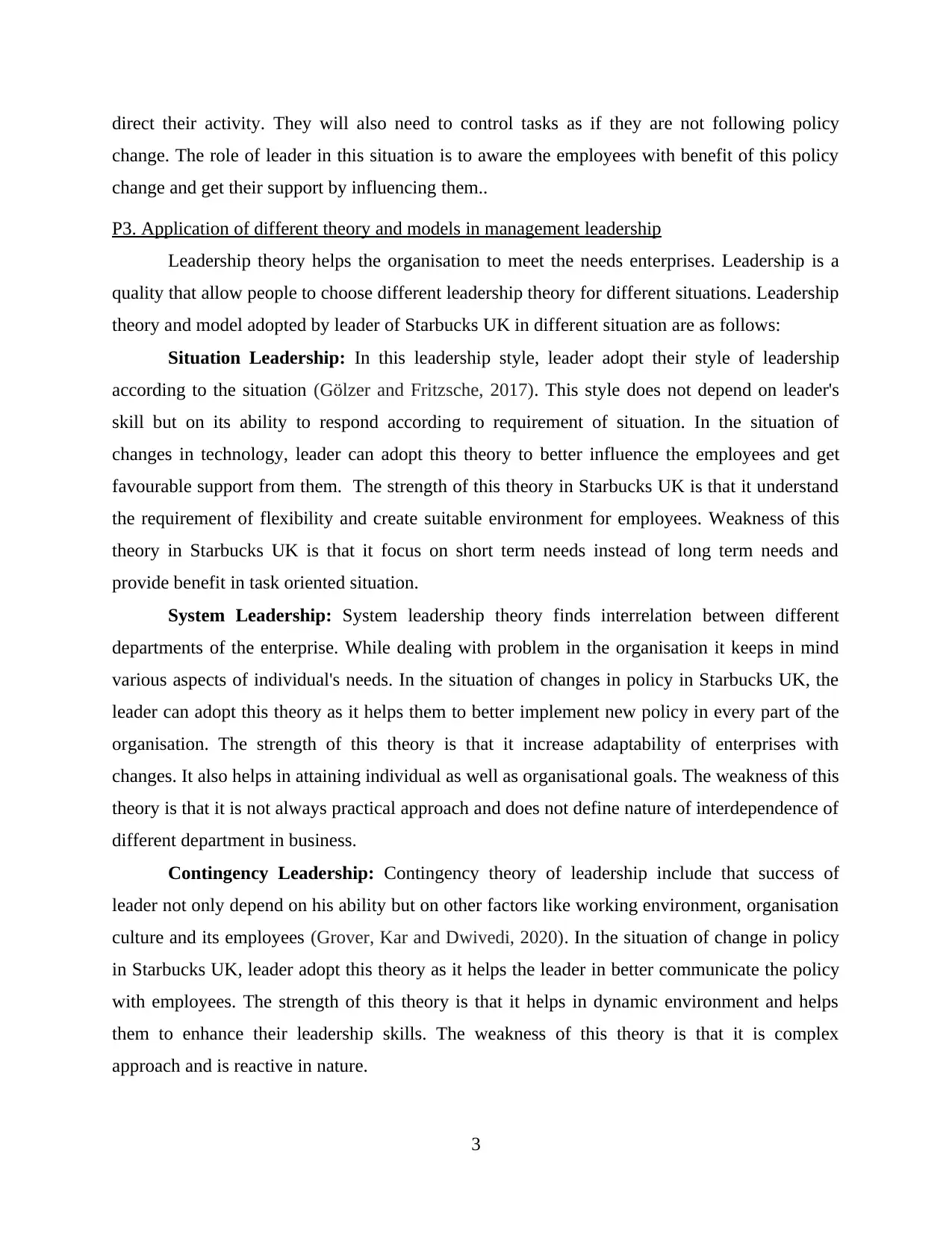
direct their activity. They will also need to control tasks as if they are not following policy
change. The role of leader in this situation is to aware the employees with benefit of this policy
change and get their support by influencing them..
P3. Application of different theory and models in management leadership
Leadership theory helps the organisation to meet the needs enterprises. Leadership is a
quality that allow people to choose different leadership theory for different situations. Leadership
theory and model adopted by leader of Starbucks UK in different situation are as follows:
Situation Leadership: In this leadership style, leader adopt their style of leadership
according to the situation (Gölzer and Fritzsche, 2017). This style does not depend on leader's
skill but on its ability to respond according to requirement of situation. In the situation of
changes in technology, leader can adopt this theory to better influence the employees and get
favourable support from them. The strength of this theory in Starbucks UK is that it understand
the requirement of flexibility and create suitable environment for employees. Weakness of this
theory in Starbucks UK is that it focus on short term needs instead of long term needs and
provide benefit in task oriented situation.
System Leadership: System leadership theory finds interrelation between different
departments of the enterprise. While dealing with problem in the organisation it keeps in mind
various aspects of individual's needs. In the situation of changes in policy in Starbucks UK, the
leader can adopt this theory as it helps them to better implement new policy in every part of the
organisation. The strength of this theory is that it increase adaptability of enterprises with
changes. It also helps in attaining individual as well as organisational goals. The weakness of this
theory is that it is not always practical approach and does not define nature of interdependence of
different department in business.
Contingency Leadership: Contingency theory of leadership include that success of
leader not only depend on his ability but on other factors like working environment, organisation
culture and its employees (Grover, Kar and Dwivedi, 2020). In the situation of change in policy
in Starbucks UK, leader adopt this theory as it helps the leader in better communicate the policy
with employees. The strength of this theory is that it helps in dynamic environment and helps
them to enhance their leadership skills. The weakness of this theory is that it is complex
approach and is reactive in nature.
3
change. The role of leader in this situation is to aware the employees with benefit of this policy
change and get their support by influencing them..
P3. Application of different theory and models in management leadership
Leadership theory helps the organisation to meet the needs enterprises. Leadership is a
quality that allow people to choose different leadership theory for different situations. Leadership
theory and model adopted by leader of Starbucks UK in different situation are as follows:
Situation Leadership: In this leadership style, leader adopt their style of leadership
according to the situation (Gölzer and Fritzsche, 2017). This style does not depend on leader's
skill but on its ability to respond according to requirement of situation. In the situation of
changes in technology, leader can adopt this theory to better influence the employees and get
favourable support from them. The strength of this theory in Starbucks UK is that it understand
the requirement of flexibility and create suitable environment for employees. Weakness of this
theory in Starbucks UK is that it focus on short term needs instead of long term needs and
provide benefit in task oriented situation.
System Leadership: System leadership theory finds interrelation between different
departments of the enterprise. While dealing with problem in the organisation it keeps in mind
various aspects of individual's needs. In the situation of changes in policy in Starbucks UK, the
leader can adopt this theory as it helps them to better implement new policy in every part of the
organisation. The strength of this theory is that it increase adaptability of enterprises with
changes. It also helps in attaining individual as well as organisational goals. The weakness of this
theory is that it is not always practical approach and does not define nature of interdependence of
different department in business.
Contingency Leadership: Contingency theory of leadership include that success of
leader not only depend on his ability but on other factors like working environment, organisation
culture and its employees (Grover, Kar and Dwivedi, 2020). In the situation of change in policy
in Starbucks UK, leader adopt this theory as it helps the leader in better communicate the policy
with employees. The strength of this theory is that it helps in dynamic environment and helps
them to enhance their leadership skills. The weakness of this theory is that it is complex
approach and is reactive in nature.
3
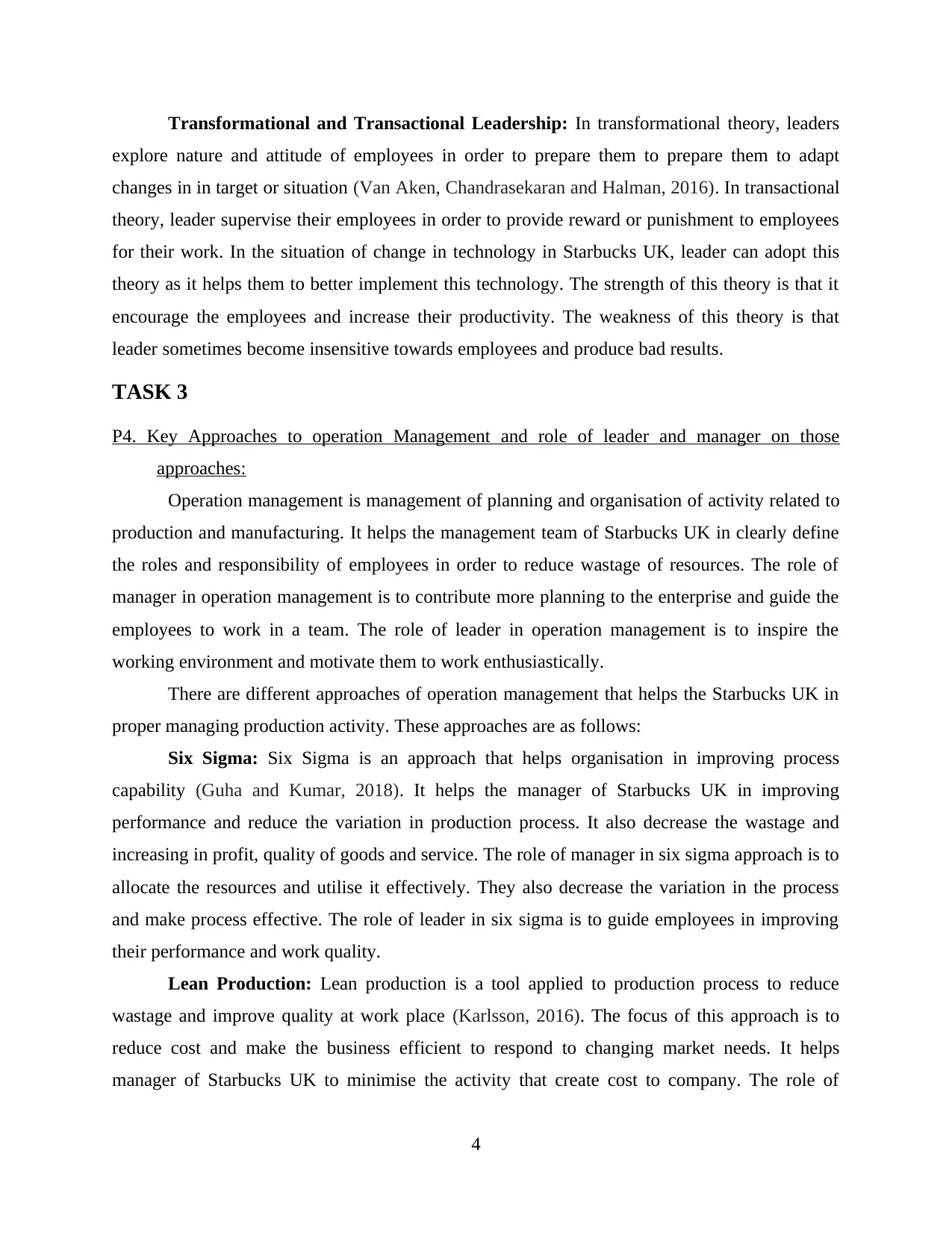
Transformational and Transactional Leadership: In transformational theory, leaders
explore nature and attitude of employees in order to prepare them to prepare them to adapt
changes in in target or situation (Van Aken, Chandrasekaran and Halman, 2016). In transactional
theory, leader supervise their employees in order to provide reward or punishment to employees
for their work. In the situation of change in technology in Starbucks UK, leader can adopt this
theory as it helps them to better implement this technology. The strength of this theory is that it
encourage the employees and increase their productivity. The weakness of this theory is that
leader sometimes become insensitive towards employees and produce bad results.
TASK 3
P4. Key Approaches to operation Management and role of leader and manager on those
approaches:
Operation management is management of planning and organisation of activity related to
production and manufacturing. It helps the management team of Starbucks UK in clearly define
the roles and responsibility of employees in order to reduce wastage of resources. The role of
manager in operation management is to contribute more planning to the enterprise and guide the
employees to work in a team. The role of leader in operation management is to inspire the
working environment and motivate them to work enthusiastically.
There are different approaches of operation management that helps the Starbucks UK in
proper managing production activity. These approaches are as follows:
Six Sigma: Six Sigma is an approach that helps organisation in improving process
capability (Guha and Kumar, 2018). It helps the manager of Starbucks UK in improving
performance and reduce the variation in production process. It also decrease the wastage and
increasing in profit, quality of goods and service. The role of manager in six sigma approach is to
allocate the resources and utilise it effectively. They also decrease the variation in the process
and make process effective. The role of leader in six sigma is to guide employees in improving
their performance and work quality.
Lean Production: Lean production is a tool applied to production process to reduce
wastage and improve quality at work place (Karlsson, 2016). The focus of this approach is to
reduce cost and make the business efficient to respond to changing market needs. It helps
manager of Starbucks UK to minimise the activity that create cost to company. The role of
4
explore nature and attitude of employees in order to prepare them to prepare them to adapt
changes in in target or situation (Van Aken, Chandrasekaran and Halman, 2016). In transactional
theory, leader supervise their employees in order to provide reward or punishment to employees
for their work. In the situation of change in technology in Starbucks UK, leader can adopt this
theory as it helps them to better implement this technology. The strength of this theory is that it
encourage the employees and increase their productivity. The weakness of this theory is that
leader sometimes become insensitive towards employees and produce bad results.
TASK 3
P4. Key Approaches to operation Management and role of leader and manager on those
approaches:
Operation management is management of planning and organisation of activity related to
production and manufacturing. It helps the management team of Starbucks UK in clearly define
the roles and responsibility of employees in order to reduce wastage of resources. The role of
manager in operation management is to contribute more planning to the enterprise and guide the
employees to work in a team. The role of leader in operation management is to inspire the
working environment and motivate them to work enthusiastically.
There are different approaches of operation management that helps the Starbucks UK in
proper managing production activity. These approaches are as follows:
Six Sigma: Six Sigma is an approach that helps organisation in improving process
capability (Guha and Kumar, 2018). It helps the manager of Starbucks UK in improving
performance and reduce the variation in production process. It also decrease the wastage and
increasing in profit, quality of goods and service. The role of manager in six sigma approach is to
allocate the resources and utilise it effectively. They also decrease the variation in the process
and make process effective. The role of leader in six sigma is to guide employees in improving
their performance and work quality.
Lean Production: Lean production is a tool applied to production process to reduce
wastage and improve quality at work place (Karlsson, 2016). The focus of this approach is to
reduce cost and make the business efficient to respond to changing market needs. It helps
manager of Starbucks UK to minimise the activity that create cost to company. The role of
4
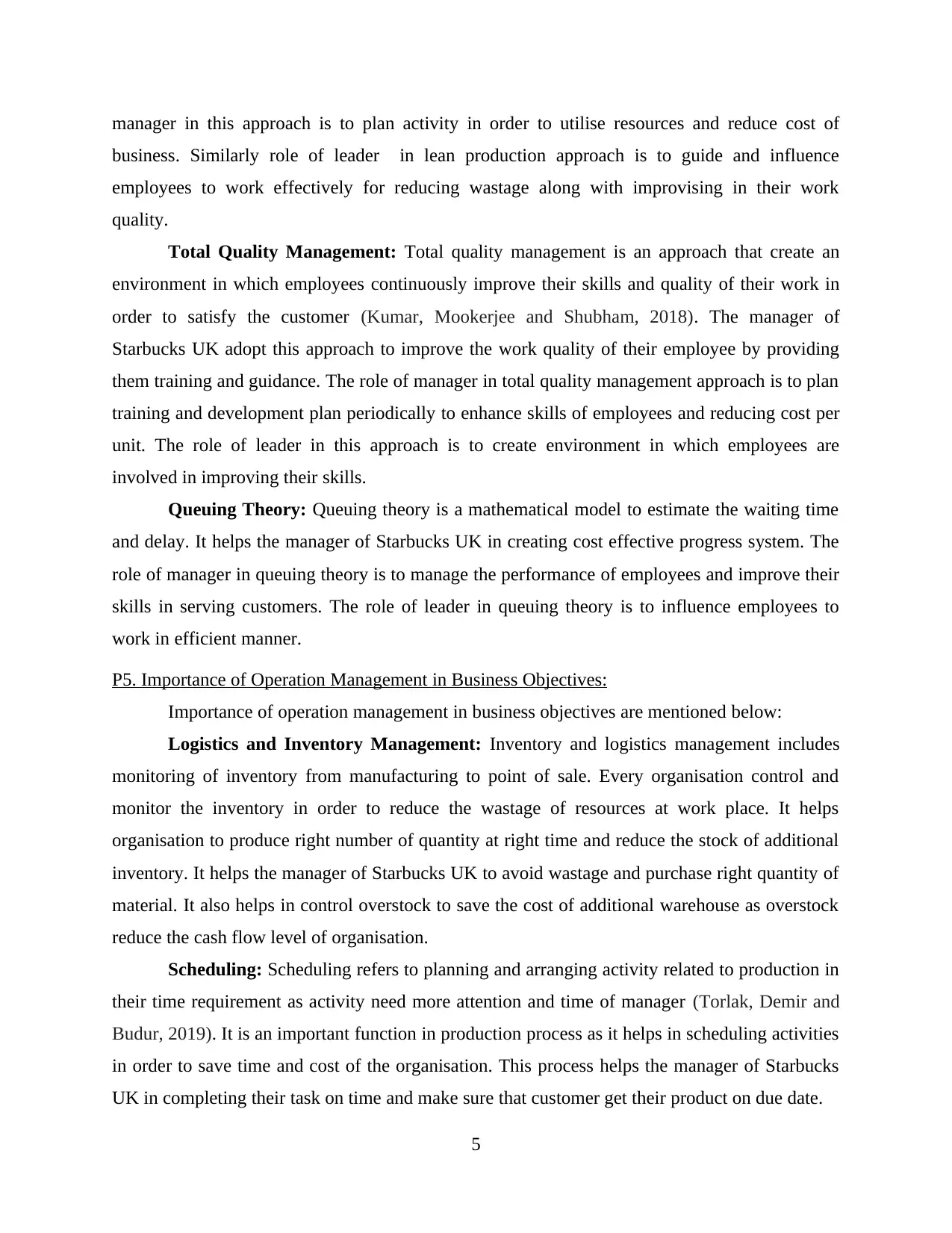
manager in this approach is to plan activity in order to utilise resources and reduce cost of
business. Similarly role of leader in lean production approach is to guide and influence
employees to work effectively for reducing wastage along with improvising in their work
quality.
Total Quality Management: Total quality management is an approach that create an
environment in which employees continuously improve their skills and quality of their work in
order to satisfy the customer (Kumar, Mookerjee and Shubham, 2018). The manager of
Starbucks UK adopt this approach to improve the work quality of their employee by providing
them training and guidance. The role of manager in total quality management approach is to plan
training and development plan periodically to enhance skills of employees and reducing cost per
unit. The role of leader in this approach is to create environment in which employees are
involved in improving their skills.
Queuing Theory: Queuing theory is a mathematical model to estimate the waiting time
and delay. It helps the manager of Starbucks UK in creating cost effective progress system. The
role of manager in queuing theory is to manage the performance of employees and improve their
skills in serving customers. The role of leader in queuing theory is to influence employees to
work in efficient manner.
P5. Importance of Operation Management in Business Objectives:
Importance of operation management in business objectives are mentioned below:
Logistics and Inventory Management: Inventory and logistics management includes
monitoring of inventory from manufacturing to point of sale. Every organisation control and
monitor the inventory in order to reduce the wastage of resources at work place. It helps
organisation to produce right number of quantity at right time and reduce the stock of additional
inventory. It helps the manager of Starbucks UK to avoid wastage and purchase right quantity of
material. It also helps in control overstock to save the cost of additional warehouse as overstock
reduce the cash flow level of organisation.
Scheduling: Scheduling refers to planning and arranging activity related to production in
their time requirement as activity need more attention and time of manager (Torlak, Demir and
Budur, 2019). It is an important function in production process as it helps in scheduling activities
in order to save time and cost of the organisation. This process helps the manager of Starbucks
UK in completing their task on time and make sure that customer get their product on due date.
5
business. Similarly role of leader in lean production approach is to guide and influence
employees to work effectively for reducing wastage along with improvising in their work
quality.
Total Quality Management: Total quality management is an approach that create an
environment in which employees continuously improve their skills and quality of their work in
order to satisfy the customer (Kumar, Mookerjee and Shubham, 2018). The manager of
Starbucks UK adopt this approach to improve the work quality of their employee by providing
them training and guidance. The role of manager in total quality management approach is to plan
training and development plan periodically to enhance skills of employees and reducing cost per
unit. The role of leader in this approach is to create environment in which employees are
involved in improving their skills.
Queuing Theory: Queuing theory is a mathematical model to estimate the waiting time
and delay. It helps the manager of Starbucks UK in creating cost effective progress system. The
role of manager in queuing theory is to manage the performance of employees and improve their
skills in serving customers. The role of leader in queuing theory is to influence employees to
work in efficient manner.
P5. Importance of Operation Management in Business Objectives:
Importance of operation management in business objectives are mentioned below:
Logistics and Inventory Management: Inventory and logistics management includes
monitoring of inventory from manufacturing to point of sale. Every organisation control and
monitor the inventory in order to reduce the wastage of resources at work place. It helps
organisation to produce right number of quantity at right time and reduce the stock of additional
inventory. It helps the manager of Starbucks UK to avoid wastage and purchase right quantity of
material. It also helps in control overstock to save the cost of additional warehouse as overstock
reduce the cash flow level of organisation.
Scheduling: Scheduling refers to planning and arranging activity related to production in
their time requirement as activity need more attention and time of manager (Torlak, Demir and
Budur, 2019). It is an important function in production process as it helps in scheduling activities
in order to save time and cost of the organisation. This process helps the manager of Starbucks
UK in completing their task on time and make sure that customer get their product on due date.
5
Paraphrase This Document
Need a fresh take? Get an instant paraphrase of this document with our AI Paraphraser
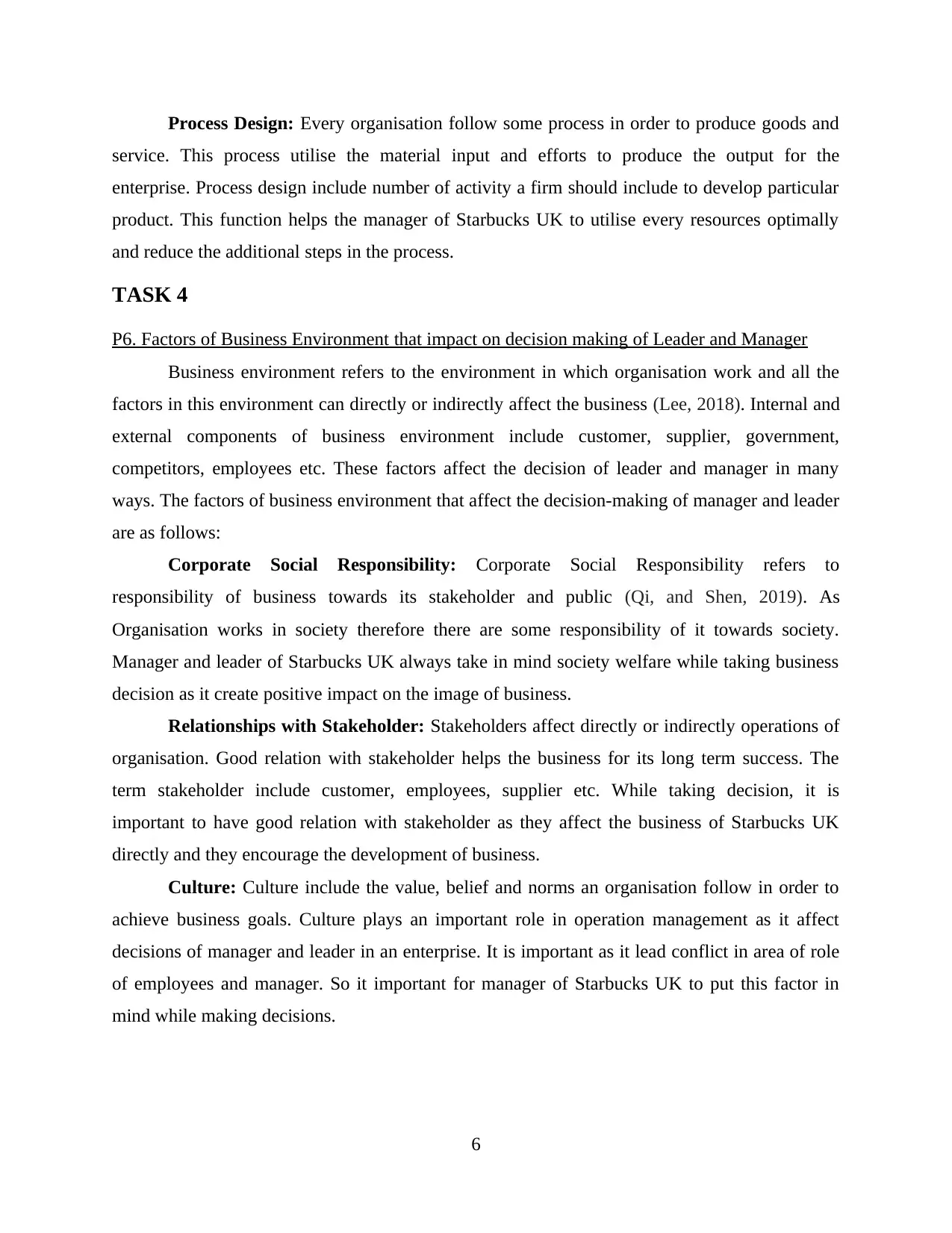
Process Design: Every organisation follow some process in order to produce goods and
service. This process utilise the material input and efforts to produce the output for the
enterprise. Process design include number of activity a firm should include to develop particular
product. This function helps the manager of Starbucks UK to utilise every resources optimally
and reduce the additional steps in the process.
TASK 4
P6. Factors of Business Environment that impact on decision making of Leader and Manager
Business environment refers to the environment in which organisation work and all the
factors in this environment can directly or indirectly affect the business (Lee, 2018). Internal and
external components of business environment include customer, supplier, government,
competitors, employees etc. These factors affect the decision of leader and manager in many
ways. The factors of business environment that affect the decision-making of manager and leader
are as follows:
Corporate Social Responsibility: Corporate Social Responsibility refers to
responsibility of business towards its stakeholder and public (Qi, and Shen, 2019). As
Organisation works in society therefore there are some responsibility of it towards society.
Manager and leader of Starbucks UK always take in mind society welfare while taking business
decision as it create positive impact on the image of business.
Relationships with Stakeholder: Stakeholders affect directly or indirectly operations of
organisation. Good relation with stakeholder helps the business for its long term success. The
term stakeholder include customer, employees, supplier etc. While taking decision, it is
important to have good relation with stakeholder as they affect the business of Starbucks UK
directly and they encourage the development of business.
Culture: Culture include the value, belief and norms an organisation follow in order to
achieve business goals. Culture plays an important role in operation management as it affect
decisions of manager and leader in an enterprise. It is important as it lead conflict in area of role
of employees and manager. So it important for manager of Starbucks UK to put this factor in
mind while making decisions.
6
service. This process utilise the material input and efforts to produce the output for the
enterprise. Process design include number of activity a firm should include to develop particular
product. This function helps the manager of Starbucks UK to utilise every resources optimally
and reduce the additional steps in the process.
TASK 4
P6. Factors of Business Environment that impact on decision making of Leader and Manager
Business environment refers to the environment in which organisation work and all the
factors in this environment can directly or indirectly affect the business (Lee, 2018). Internal and
external components of business environment include customer, supplier, government,
competitors, employees etc. These factors affect the decision of leader and manager in many
ways. The factors of business environment that affect the decision-making of manager and leader
are as follows:
Corporate Social Responsibility: Corporate Social Responsibility refers to
responsibility of business towards its stakeholder and public (Qi, and Shen, 2019). As
Organisation works in society therefore there are some responsibility of it towards society.
Manager and leader of Starbucks UK always take in mind society welfare while taking business
decision as it create positive impact on the image of business.
Relationships with Stakeholder: Stakeholders affect directly or indirectly operations of
organisation. Good relation with stakeholder helps the business for its long term success. The
term stakeholder include customer, employees, supplier etc. While taking decision, it is
important to have good relation with stakeholder as they affect the business of Starbucks UK
directly and they encourage the development of business.
Culture: Culture include the value, belief and norms an organisation follow in order to
achieve business goals. Culture plays an important role in operation management as it affect
decisions of manager and leader in an enterprise. It is important as it lead conflict in area of role
of employees and manager. So it important for manager of Starbucks UK to put this factor in
mind while making decisions.
6
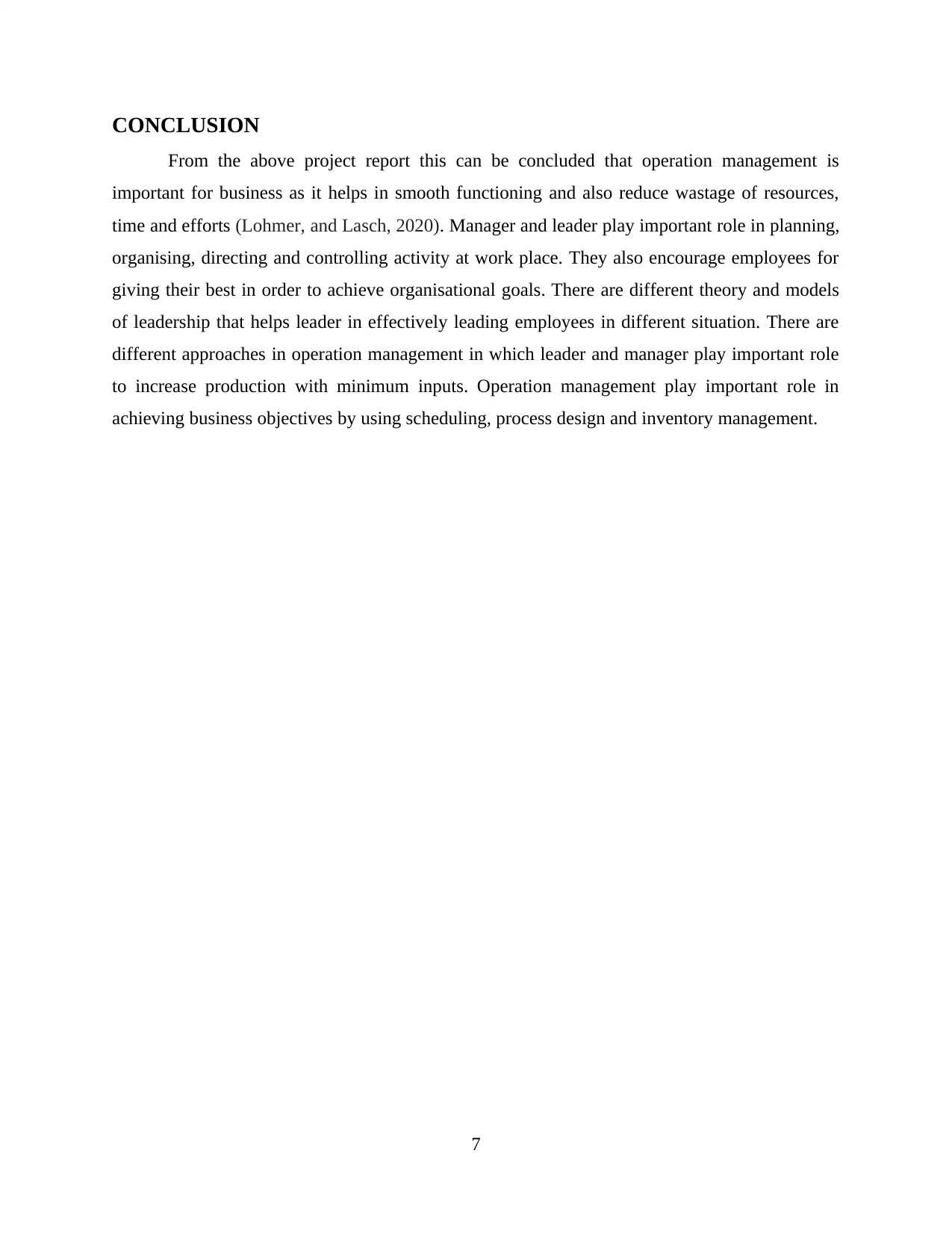
CONCLUSION
From the above project report this can be concluded that operation management is
important for business as it helps in smooth functioning and also reduce wastage of resources,
time and efforts (Lohmer, and Lasch, 2020). Manager and leader play important role in planning,
organising, directing and controlling activity at work place. They also encourage employees for
giving their best in order to achieve organisational goals. There are different theory and models
of leadership that helps leader in effectively leading employees in different situation. There are
different approaches in operation management in which leader and manager play important role
to increase production with minimum inputs. Operation management play important role in
achieving business objectives by using scheduling, process design and inventory management.
7
From the above project report this can be concluded that operation management is
important for business as it helps in smooth functioning and also reduce wastage of resources,
time and efforts (Lohmer, and Lasch, 2020). Manager and leader play important role in planning,
organising, directing and controlling activity at work place. They also encourage employees for
giving their best in order to achieve organisational goals. There are different theory and models
of leadership that helps leader in effectively leading employees in different situation. There are
different approaches in operation management in which leader and manager play important role
to increase production with minimum inputs. Operation management play important role in
achieving business objectives by using scheduling, process design and inventory management.
7
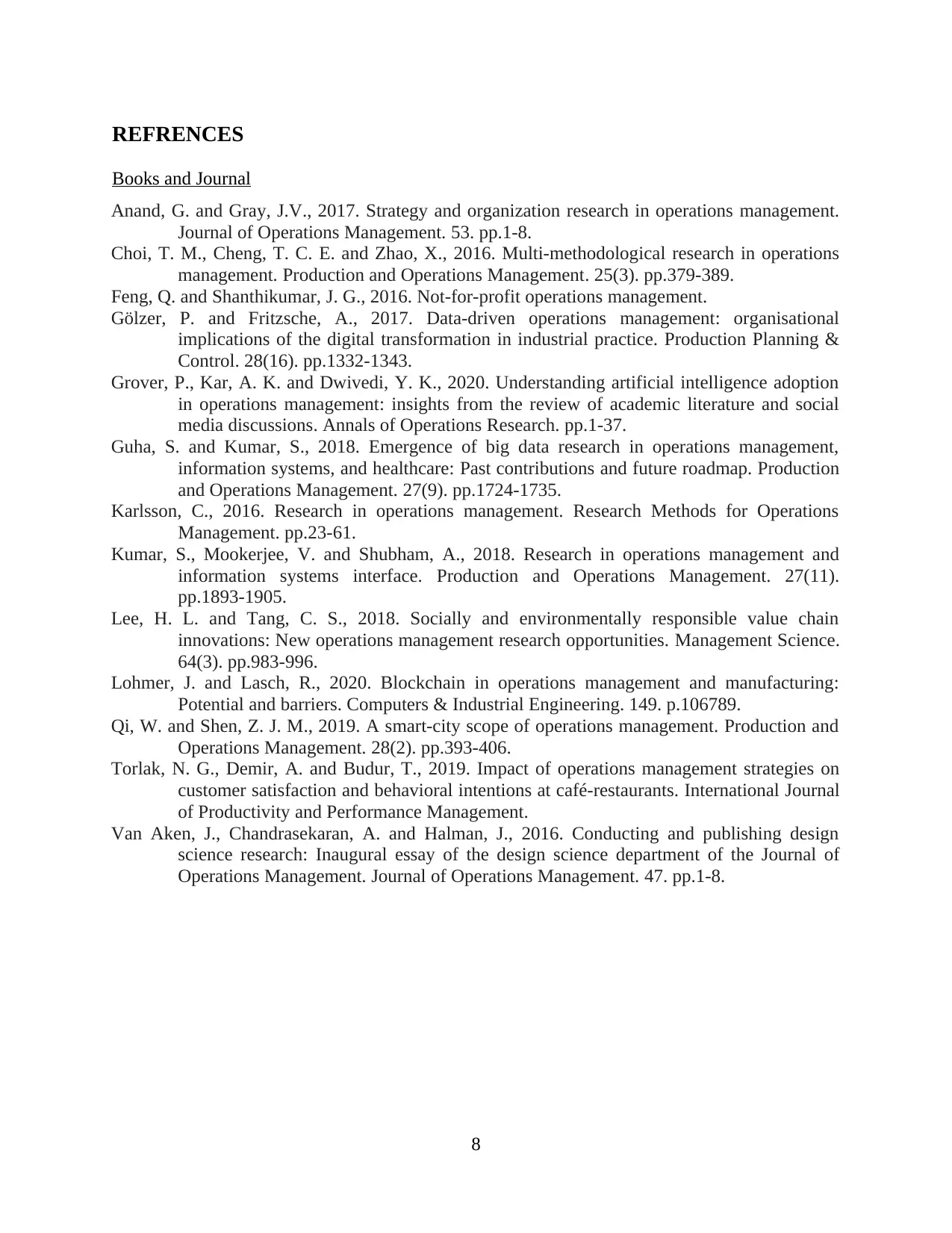
REFRENCES
Books and Journal
Anand, G. and Gray, J.V., 2017. Strategy and organization research in operations management.
Journal of Operations Management. 53. pp.1-8.
Choi, T. M., Cheng, T. C. E. and Zhao, X., 2016. Multi‐methodological research in operations
management. Production and Operations Management. 25(3). pp.379-389.
Feng, Q. and Shanthikumar, J. G., 2016. Not-for-profit operations management.
Gölzer, P. and Fritzsche, A., 2017. Data-driven operations management: organisational
implications of the digital transformation in industrial practice. Production Planning &
Control. 28(16). pp.1332-1343.
Grover, P., Kar, A. K. and Dwivedi, Y. K., 2020. Understanding artificial intelligence adoption
in operations management: insights from the review of academic literature and social
media discussions. Annals of Operations Research. pp.1-37.
Guha, S. and Kumar, S., 2018. Emergence of big data research in operations management,
information systems, and healthcare: Past contributions and future roadmap. Production
and Operations Management. 27(9). pp.1724-1735.
Karlsson, C., 2016. Research in operations management. Research Methods for Operations
Management. pp.23-61.
Kumar, S., Mookerjee, V. and Shubham, A., 2018. Research in operations management and
information systems interface. Production and Operations Management. 27(11).
pp.1893-1905.
Lee, H. L. and Tang, C. S., 2018. Socially and environmentally responsible value chain
innovations: New operations management research opportunities. Management Science.
64(3). pp.983-996.
Lohmer, J. and Lasch, R., 2020. Blockchain in operations management and manufacturing:
Potential and barriers. Computers & Industrial Engineering. 149. p.106789.
Qi, W. and Shen, Z. J. M., 2019. A smart‐city scope of operations management. Production and
Operations Management. 28(2). pp.393-406.
Torlak, N. G., Demir, A. and Budur, T., 2019. Impact of operations management strategies on
customer satisfaction and behavioral intentions at café-restaurants. International Journal
of Productivity and Performance Management.
Van Aken, J., Chandrasekaran, A. and Halman, J., 2016. Conducting and publishing design
science research: Inaugural essay of the design science department of the Journal of
Operations Management. Journal of Operations Management. 47. pp.1-8.
8
Books and Journal
Anand, G. and Gray, J.V., 2017. Strategy and organization research in operations management.
Journal of Operations Management. 53. pp.1-8.
Choi, T. M., Cheng, T. C. E. and Zhao, X., 2016. Multi‐methodological research in operations
management. Production and Operations Management. 25(3). pp.379-389.
Feng, Q. and Shanthikumar, J. G., 2016. Not-for-profit operations management.
Gölzer, P. and Fritzsche, A., 2017. Data-driven operations management: organisational
implications of the digital transformation in industrial practice. Production Planning &
Control. 28(16). pp.1332-1343.
Grover, P., Kar, A. K. and Dwivedi, Y. K., 2020. Understanding artificial intelligence adoption
in operations management: insights from the review of academic literature and social
media discussions. Annals of Operations Research. pp.1-37.
Guha, S. and Kumar, S., 2018. Emergence of big data research in operations management,
information systems, and healthcare: Past contributions and future roadmap. Production
and Operations Management. 27(9). pp.1724-1735.
Karlsson, C., 2016. Research in operations management. Research Methods for Operations
Management. pp.23-61.
Kumar, S., Mookerjee, V. and Shubham, A., 2018. Research in operations management and
information systems interface. Production and Operations Management. 27(11).
pp.1893-1905.
Lee, H. L. and Tang, C. S., 2018. Socially and environmentally responsible value chain
innovations: New operations management research opportunities. Management Science.
64(3). pp.983-996.
Lohmer, J. and Lasch, R., 2020. Blockchain in operations management and manufacturing:
Potential and barriers. Computers & Industrial Engineering. 149. p.106789.
Qi, W. and Shen, Z. J. M., 2019. A smart‐city scope of operations management. Production and
Operations Management. 28(2). pp.393-406.
Torlak, N. G., Demir, A. and Budur, T., 2019. Impact of operations management strategies on
customer satisfaction and behavioral intentions at café-restaurants. International Journal
of Productivity and Performance Management.
Van Aken, J., Chandrasekaran, A. and Halman, J., 2016. Conducting and publishing design
science research: Inaugural essay of the design science department of the Journal of
Operations Management. Journal of Operations Management. 47. pp.1-8.
8
Secure Best Marks with AI Grader
Need help grading? Try our AI Grader for instant feedback on your assignments.

9
1 out of 11
Related Documents
Your All-in-One AI-Powered Toolkit for Academic Success.
+13062052269
info@desklib.com
Available 24*7 on WhatsApp / Email
![[object Object]](/_next/static/media/star-bottom.7253800d.svg)
Unlock your academic potential
© 2024 | Zucol Services PVT LTD | All rights reserved.


![[SOLVED] Total Quality Management Process and PESTLE Analysis](/_next/image/?url=https%3A%2F%2Fdesklib.com%2Fmedia%2Fimages%2Fit%2Fb5f36035c6fb46e3bab28de563793dd8.jpg&w=256&q=75)


